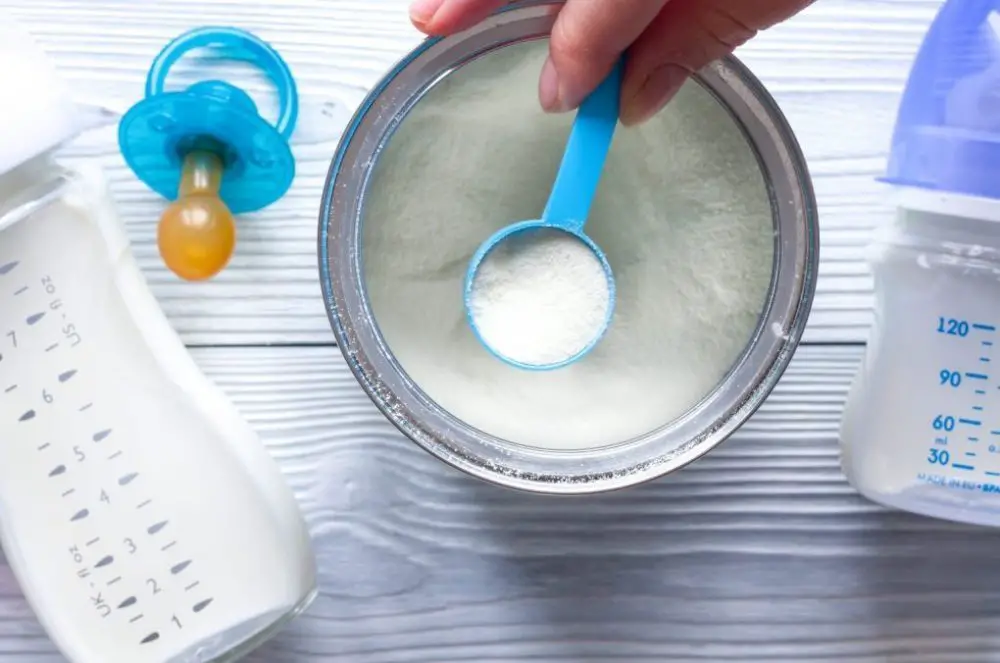As babies grow, a time will come when they would not have any need for exclusive formula meals, especially when they approach a year old.
When your child reaches 12 months old, you can then begin to give him or her whole milk. But you must never give that baby skimmed milk, only whole milk because they need all the nutrients that can only be found in whole milk to have proper development of the brain.
You should stick to only whole milk and avoid skimmed milk until the baby reaches at least age 2. You can give the baby some amounts of whole milk measuring up to 2 cups a day. (1)
Health professionals agree that when babies have not clocked the age of one, their body system is still very fragile and not strong enough to process milk.
At this stage, he or she needs breast milk or formula. If you are a nursing mother and you are wondering how and when to switch from formula to milk, you are in the right place.
In this article, you will learn how to switch from formula to milk gradually.
There could be some resistance to whole milk during the first few weeks. When this happens, you have to switch gradually from formula to milk.
This is because the baby needs some time to adapt to the new feeding method.
Babies who no longer drink breast milk, and have no allergies regarding food, and babies who are not selective of what they eat, can start to drink whole milk the moment they turn a year old.
Formulas are made as a great alternative in cases where your baby lacks the ability to drink whole milk. Also, if you have a baby who is very selective about what he or she eats, the formula is a wonderful option.
This is because formulas are made from different elements such as soy. They are also fortified with iron.
Almond milk, soy milk, and goat milk are perfect substitutes for cow’s milk, this is because they are low in fat.
However, they too may not serve as the best choice for your babies until they are older.
You may want to consider giving your baby Cow Milk; however, cow milk has some problems as far as babies are concerned.
They are never recommended to be given to babies at least with the first year of birth. (2)
Let Us, Therefore, Take A Look at Some of The Problems of Cow Milk in The Life of Your Baby:
- As babies are different, so are their level of development, there could be a lack of ability to effectively digest whole milk
- Cow milk may have inadequate levels of Vitamin C, Iron, and some other important nutrient. This may lead to nutrient deficiency, loss of blood, and other related issues.
- Too much protein content
- High mineral content
- Cow milk may also cause irritations or allergies inside the stomach and intestines.
As soon as your baby is old enough to consume milk and that is about 1 year old, begin to feed them whole milk first, and keep to it until they are at least 2 years old.
Whole milk is the food that provides all the fat your baby needs at this time. Vitamin A and Vitamin D are fat-soluble vitamins, and the fact that whole milk provides enhances their absorption into the body system.
Skimmed milk contains too much mineral and protein that could be injurious to the baby at this stage of development.
You can begin to give your baby skimmed milk or low-fat-milk as soon they are 2 years old, however, it is recommended that you see your baby’s pediatrician to discuss this issue before you go ahead.
How to Switch from Formula to Milk
When the question of how to switch from formula to milk arises, there are several answers, and more than enough methods to handle it.
A lot of parents simply take the “go right ahead approach” and begin to replace all the bottles of formula with bottles of milk. This good only when your baby is calm and not selective of what they eat.
However, if your baby is the type that needs a lot of time to adapt to any change, then you may find yourself taking things easy.
Before you switch from formula to milk, you have to, first of all, know the kind of milk that is actually suitable for your baby. Kids who not up to two years old should be fed with Full Cream Milk. (3)
Cow milk that is Vit D-fortified can only be given to babies who are two years and over.
You will begin to feed your baby with soy milk when they are at least 1 year of age but be careful with the kind of soy milk you buy, this is because different brands of soy milk differ in their nutrient content.
You must ensure that it has vitamin A and vitamin D. check also if the one you are buying has a good content of calcium to maintain strong bones. Compare different brands so that you can be able to find out the one that has enough protein content.
In all, you should try as much you can to avoid rice milk, because it contains low amounts of B vitamins, protein, and calcium. Rice milk is poor in children’s nutrition.
Taking things gradually will afford you the opportunity to persuade the baby into accepting the new food, also you will be able to check in case your baby is showing some allergies to the milk you are giving him or her.
If you begin to see signs like breathing difficulties, cough, diarrhea, or runny nose, see your pediatrician immediately. (4)
These signs may sometimes be an indication that your baby’s body system is still too fragile to process milk. If you can successfully give the child about 8 ounces of milk every day for the first few weeks without seeing any of those signs, then you can up the amount.
As the child begins to come to terms with the new food, now gradually raise the amount while you gradually eliminate formula totally. The daily amount of milk that toddlers should take every day is between 20 and 24 ounces.
If you have a child who is more aggressive and does not adapt quickly to change, then you would need to take things even more gradually, this case may take a long while. If you believe you need to take a more subtle approach, that is good too.
To do this, you just have to mix together both the milk and the formula. Just incorporate a little milk into the formula at the early stage of the transitioning.
Once you are successful with this, you should raise the amount of milk you incorporate into the formula day after day until you have only milk in the baby’s bottle.
By this time, you would have successfully eliminated formula from the baby’s diet.
Cold whole milk may have a negative effect on a couple of babies, and this may make you want to put the milk in hot water to make it warm a bit, it is good though the downside to it is that it may well become a habit which would eventually become difficult to continue with.
The idea is that you can train your baby to be comfortable with either warm milk or cold milk as long as can stick to the habit.
Cups or Bottles?
 One other issue that may arise when switching from a formula diet to milk is the issue of whether or not the baby would still be using sippy cups.
One other issue that may arise when switching from a formula diet to milk is the issue of whether or not the baby would still be using sippy cups.
You have to decide whether you would still be using cups when you switch to whole milk or simply wait till after some time, bearing in mind that you have to take things gradually.
Then again, whether or not you still want to use sippy cups sometimes depends on the baby in question. If you think your child might find it difficult to adapt to a change in feeding container then you would want to switch to milk and later on you will totally eliminate the bottles.
Whatever you do, just do what is in the best interest of your baby.
Unique Cases
There are some unique cases in which you cannot just switch to feeding your baby with whole milk as soon as he or she clocks one. Sometimes, it could be due to the fact that that baby has had an intolerance to milk protein.
There are times when some infants will continue to keep away from cow’s milk, while others have quickly outgrown whatever allergy they must have had earlier on. However, you should try to see your child’s pediatrician in all cases.
There is also some time when your baby will totally refuse milk as you make the switch. When this happens, you should just find other alternatives such as finding some other ways you can derive calcium to incorporate in the baby’s meal. (5)
You should never force your infant to consume milk, because it may lead to some other complications that can be costly if you try too much.


Leave a Reply